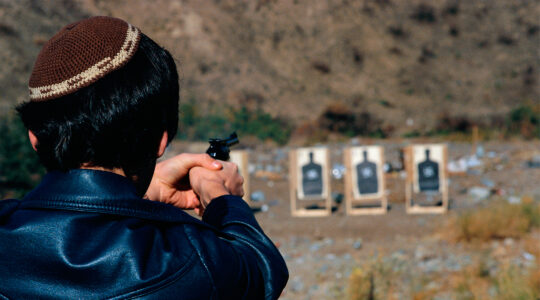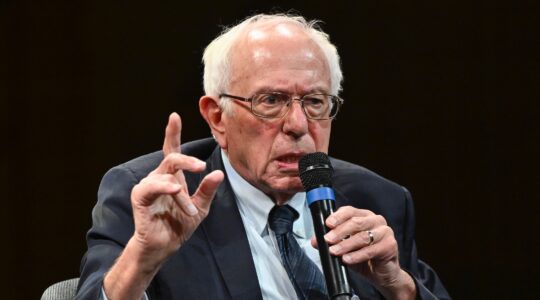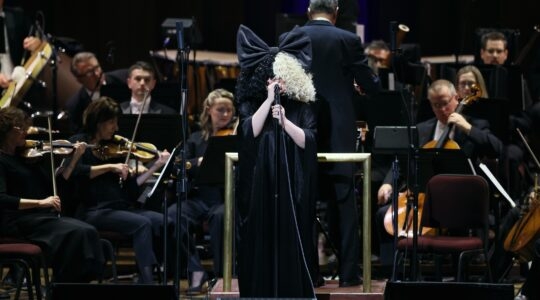
Arieh O’Sullivan takes the pledge to join the Sons of Confederate Veterans at a ceremony in Biloxi, Miss., Feb. 22, 2012. (Arieh O’Sullivan)
NEW YORK (JTA) — The first time I met Arieh O’Sullivan was in the predawn darkness of a winter morning in Jerusalem in 1997, when he came to pick me up in a jeep emblazoned with the Confederate flag on its spare tire.
I was just starting out as a journalist and working as a cub reporter at The Jerusalem Post, and O’Sullivan, a veteran of The Associated Press, was the Post’s seasoned military correspondent. I thought O’Sullivan had one of the coolest jobs in the world, and it turned out that this diminutive Jew with an Irish name and a Southern accent was a pretty cool guy, too.
O’Sullivan drove us through the darkness to a military base near Ben Gurion Airport in Tel Aviv, where we hitched a ride aboard a C-130 Hercules aircraft bound for the Ovda air base in the Negev Desert. On the ground we were met by two minders from the military spokesman’s office and packed into a jeep for a bone-shattering, off-road tear through the desert to the site of an Israel Defense Forces combat exercise.
O’Sullivan was writing a story on the IDF Engineering Corps; I was tagging along to write a sidebar about the women who teach military combat.
From our perch overlooking a dusty valley, we watched as hundreds of soldiers laid down bridges, jumped out of armored personnel carriers and did whatever else engineering corps soldiers are supposed to do. When the exercise was over and we had done our interviews, we were taken to a nearby base for a chat with a high-ranking general. I remember two things from that meeting: the red phone that sat on the general’s desk and the long lunch of Israeli schnitzel, potatoes and hummus that followed.
That day remains one of my favorite as a reporter.
O’Sullivan, 50, has moved on in his career. He is now the Mideast bureau chief for The Media Line, a nonprofit that supplies news outlets with stories about the Middle East. But a few things have stuck with him: his sharp eye, a commitment to journalism and that jeep with the Confederate flag. It also has a statue of General Robert E. Lee glued to the dashboard.
“I’ve always been proud of the fact that I come from the South,” said O’Sullivan, who was born and raised in New Orleans and moved to Mississippi before making aliyah in 1981. “There’s some kind of kinship between Israel and the Confederacy: Both are mired in self-pity, victimology and obsession with history.”
On Wednesday, O’Sullivan took his Southern credentials up a notch: He was sworn in as a member of the Sons of Confederate Veterans, an organization “open to all male descendants of any veteran who served honorably in the Confederate armed forces.” O’Sullivan’s great-great-granddaddy, George Johnson, served for a year as a lieutenant in the Alabama Rangers, a cavalry division of the Confederate Army.
“It was a real unique ceremony,” O’Sullivan said Wednesday in a phone interview from Biloxi, Miss., where the induction took place. “It was like redneck meets Jew.”
O’Sullivan says he was told he is the first Israeli to become a member of the Sons of Confederate Veterans. The organization’s membership coordinator, Bryan Sharp, was unable to confirm that, but he noted that the organization has chapters in Brazil, Australia, England, Scotland and Germany.
Some critics have accused the Sons of Confederate Veterans of tolerating white supremacists in its ranks, but Jim Woodrick, director of historic preservation at the Mississippi Department of Archives and History, says it’s not a racist group.
“There’s no question that individual members of the Sons of Confederate Veterans have very political views, but it is not in any way a white supremacist organization,” he said.
Sharp notes that the Sons has members who are black, Native American and Hispanic — not to mention Jewish.
“People think the Sons of Confederate Veterans is just a bunch of Ku Klux Klan types and rednecks,” O’Sullivan told me in an interview a few weeks before his induction. “I don’t know if that’s true or not, but I’m going to show that it’s not an extremist organization but just one to remember veterans who served in the South.”
Almost as soon as O’Sullivan’s aunt discovered the family’s Confederate ancestor, O’Sullivan says, he decided to apply for membership.
“Yankees were educated that the Civil War was about freeing the slaves, and I was taught that the war was about protecting your homeland,” O’Sullivan told JTA. “I can recognize that my ancestors took a stand, didn’t just sit by and let history pass them up. They believed in something. They had this vicious war on their own turf and they should be remembered for that.”
In a way, O’Sullivan followed in Johnson’s footsteps. He, too, went to fight for something he believed in, immigrating to Israel on the eve of the Lebanon War. When O’Sullivan’s paratrooper unit swept into Beirut in 1982, O’Sullivan carried a Confederate flag in one of his pouches — he brought the flag with him to this week’s ceremony. And like Johnson, who was a farm boy from Alabama, O’Sullivan tends an olive field near his home in a moshav near Beit Shemesh, about 30 minutes from Jerusalem.
“I realized at 20 years old that there were things more important than family, more important than home, more important than country,” O’Sullivan said. “I joined this Zionist endeavor, came to Israel, almost immediately was in the army and almost immediately was in the war.
“I had a great-grandfather who did his shtick; he was in the cavalry,” O’Sullivan said. “I did my shtick. I came to Israel, I joined the army, I was an officer, I was a paratrooper. I did it here.”
O’Sullivan remains fiercely proud of his Southern heritage. He notes how Charleston, S.C., once was the most Jewish city in America, how 3,000 Jews served in the Confederate Army and how a Jew, Judah P. Benjamin, served as the Confederacy’s attorney general, secretary of war and secretary of state.
That same devotion to heritage spurred O’Sullivan to take his son to Dublin, Ireland, last summer to see where his father’s grandfather came from. His father was the one who chose Judaism, converting from Catholicism as a young man.
At Wednesday’s ceremony, O’Sullivan received a certificate from a man in a Confederate uniform and took an oath that included a pledge of allegiance to the United States and to support activities that “cultivate, perpetuate and sanctify the memory of the Confederacy.”
For O’Sullivan, a big part of that is his 23-year-old jeep, which he calls General Lee. When Palestinians stole it in 2004, O’Sullivan worked his connections to locate the thieves and then drove deep into the West Bank to buy it back. The only damage was to his flag and dashboard statue, which he calls “the only Confederate shrine in the Holy Land.”
These days, O’Sullivan says the only trouble he gets with his jeep are uninformed questions from Yankees living in Israel.
“They say, What do you got that flag for?’ ” O’Sullivan said. “I explain that it’s where I come from and I say it’s a flag of pride.”

Help ensure Jewish news remains accessible to all. Your donation to the Jewish Telegraphic Agency powers the trusted journalism that has connected Jewish communities worldwide for more than 100 years. With your help, JTA can continue to deliver vital news and insights. Donate today.





